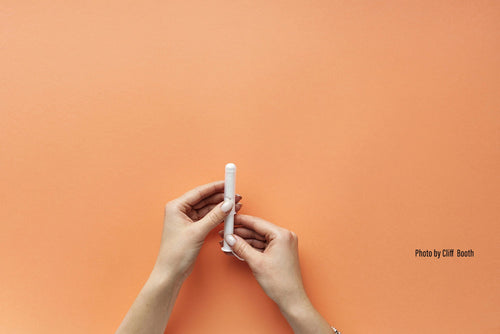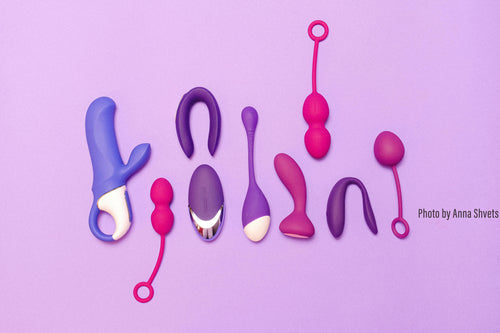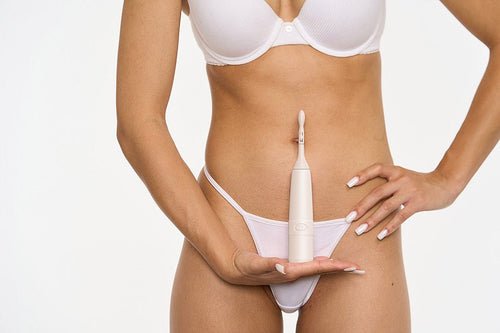Lubricants 101: Water-Based vs. Silicone-Based and What to Use with Your Sex Toys
Lubricants 101: Water-Based vs. Silicone-Based and What to Use with Your Sex Toys
When it comes to enhancing sexual pleasure, lubricants are one of the most underrated essentials. Whether you're using a vibrator, stroker, or simply enjoying intimate touch, the right lube can increase comfort, heighten sensation, and help reduce friction that might otherwise lead to irritation or injury.
But not all lubricants are created equal — and using the wrong one with your sex toy can cause damage or reduce effectiveness. Let’s break down the two most common types: water-based and silicone-based lubricants, and which one works best for your body, your play style, and your toys.
Water-Based Lubricants: Safe, Versatile, and Toy-Friendly
Water-based lubes are the most popular choice for everyday use, and for good reason.
-
They’re safe to use with all types of sex toys, including those made from silicone, TPE, rubber, glass, and metal.
-
They’re easy to clean up — just a little warm water and soap will do the trick.
-
Most are pH-balanced and gentle enough for sensitive skin.
Pros:
-
Compatible with all materials
-
Non-staining and easy to rinse off
-
Feels natural and lightweight
-
Available in flavored, warming, and cooling options
Cons:
-
May need to be reapplied during longer sessions
-
Can dry out faster, especially with air exposure
Water-based lube is the perfect match for products like the Celebrator, where silicone construction requires a non-silicone lubricant to protect the surface. It’s also ideal if you’re using sex toys that involve internal use or multiple materials.
Silicone-Based Lubricants: Long-Lasting and Ultra-Slick
Silicone lubes are known for their staying power — they’re ultra-slick, don’t dry out easily, and are perfect for shower or bath play. But they come with an important caution: do not use silicone lube with silicone sex toys. The ingredients can degrade the surface of the toy, leading to a sticky texture, breakdown, or even permanent damage.
Pros:
-
Extremely long-lasting
-
Water-resistant (great for shower or wet play)
-
Great for anal play or long sessions where friction is a concern
Cons:
-
Not safe for use with silicone toys
-
Can be harder to clean off skin and sheets
-
Not ideal for people prone to irritation
If you're using glass, stainless steel, or ABS plastic sex toys, silicone lubricant can be a game-changer for smooth, silky sessions. Just double-check the material of your toy first.
How to Choose the Right Lube for Your Toy
To keep things simple, here’s a quick guide:
| Toy Material | Safe with Water-Based? | Safe with Silicone-Based? |
|---|---|---|
| Silicone | ✅ Yes | ❌ No |
| Glass | ✅ Yes | ✅ Yes |
| Stainless Steel | ✅ Yes | ✅ Yes |
| ABS Plastic | ✅ Yes | ✅ Yes |
| TPE/TPR (Rubber-like) | ✅ Yes | ❌ Usually not recommended |
Always check your toy manufacturer’s care guide if you're unsure — using the wrong lube can shorten the lifespan of your favorite products and affect your experience.
Bottom Line
Lube isn't just a "nice-to-have" — it’s a key part of safe, comfortable, and pleasure-enhancing sex. Whether you’re enjoying a solo session with your vibrator or engaging in partnered play, choosing the right lubricant can make all the difference.
For other silicone sex toys, water-based lubricant is the clear winner — it’s safe, effective, and easy to use. If you’re into longer sessions or water play with non-silicone toys, silicone-based lube may be worth exploring.
No matter your preference, when it comes to lubrication, more is more — and your body will thank you.
Related Posts
-

Nutrition and Sexual Wellness: What You Eat Matters More Than You Think
Nutrition and Sexual Wellness: What You Eat Matters More Than You Think When people think about sexual wellness, they...
-

Intimacy for the Modern Woman: Balancing Wellness, Pleasure, and Self-Care
Intimacy for the Modern Woman: Balancing Wellness, Pleasure, and Self-Care In today’s world, women juggle careers, re...
-

I Heard My Ex Wants to Start Dating Again… Should I?
I Heard My Ex Wants to Start Dating Again… Should I? You’ve just heard that your ex is planning to start dating again...
-

Menopause and Sexual Wellness: Navigating Pleasure Through the Change
Menopause and Sexual Wellness: Navigating Pleasure Through the Change Menopause is a natural transition, but let’s be...
-

How to repair a relationship after cheating?
How to Repair a Relationship After Cheating: Rebuilding Trust and Intimacy Few things shake a relationship to its cor...
-

My Spouse Wants to Try the Swinging Lifestyle — What Now?
My Spouse Wants to Try the Swinging Lifestyle — What Now? Hearing your partner say they’re interested in the swinging...
-

The difference between IPX ratings and how to care/cleaning your toy
Understanding IPX Ratings: What They Mean for Your Sex Toy and How to Clean It Safely When it comes to choosing the r...
-

Yoga and sexual health
Yoga and Sexual Health: The Mind-Body Connection to Better Pleasure Yoga is often celebrated for its ability to relie...
-

Personal shaving - is shaving pubic hair the right move? Is it healthy or not?
Personal Shaving: Is Shaving Pubic Hair the Right Move for You? Pubic hair grooming is a personal choice, influenced ...
-

The Power of Vibrations: How Different Vibrations Affect Your Sexual Pleasure
The Power of Vibrations: How Different Vibrations Affect Your Sexual Pleasure When it comes to sex toys, vibration is...
-

How to Choose Sustainable and Eco-Friendly Sex Toys
How to Choose Sustainable and Eco-Friendly Sex Toys As environmental awareness grows, many people are rethinking the...
-

The Link Between Sexual Health and Mental Well-being
The Link Between Sexual Health and Mental Well-being When people think about managing stress and anxiety, practices l...
-

How to Build Confidence Through Sexual Wellness
How to Build Confidence Through Sexual Wellness Confidence isn’t just about how we present ourselves to the world—it...
-

How to Use Sex Toys to Enhance Your Solo Play Experience
How to Use Sex Toys to Enhance Masturbation Solo play is a powerful form of self-discovery, relaxation, and empowerme...
-

How to Use Sex Toys to Enhance Your Solo Play Experience
How to Use Sex Toys to Enhance Your Solo Play Experience Solo play—also known as masturbation—is one of the most nat...
-

The Role of Lubrication in Enhancing Your Sex Toy Experience
The Role of Lubrication in Enhancing Your Sex Toy Experience When it comes to using sex toys, there's one simple ad...
-

Sexual Wellness for People with Disabilities: Exploring Accessible Toys
Sexual Wellness for People with Disabilities: Exploring Accessible Toys Sexuality is a core part of being human—and t...
-

How to Talk to Your Partner About Introducing Sex Toys into Your Relationship
Bringing up sex toys with your partner might feel awkward at first, but with the right approach, it can open the door...
-

How Hormones Affect Your Sexual Desire—And How Sex Toys Can Help
Hormones play a major role in our sexual desire, influencing everything from arousal to sensitivity. Throughout life,...
-

Postpartum Pleasure: Overcoming Orgasm Challenges After Childbirth
Bringing a baby into the world is a life-changing experience, but many women find that their bodies—and their pleasur...
-

Mindful Masturbation: How to Incorporate Mindfulness with Sex Toys
In a world filled with distractions, many people rush through self-pleasure without truly being present in the moment...
-

Sexual Wellness for Men: Exploring Products Beyond the Basics
Here’s a blog draft for your topic: Sexual Wellness for Men: Exploring Products Beyond the Basics When it comes to s...
-

Sex Toys for Couples: How to Improve Communication and Intimacy
Here’s a blog draft for you: Introducing sex toys into a relationship can be an exciting way to enhance intimacy, st...
-

Exploring Your Pleasure Zones: A Beginner’s Guide to Self-Exploration * Understanding Your Body and Enhancing Self-Pleasure
Self-exploration is a natural and empowering part of understanding your body, desires, and sexual wellness. Yet, for ...
-

Top 5 Myths About Sex Toys—And the Truth Behind Them
Sex toys have been around for centuries, yet they still carry a lot of stigma and misinformation. Whether due to cult...
-

Are Tampons Safe? Understanding the Hidden Risks of Tampon Use
For decades, tampons have been a go-to menstrual product for millions of women worldwide. Convenient, discreet, and e...
-

How to Safely Clean and Care for Your Sex Toys: A Guide for All Genders
Sex toys can be a fantastic way to enhance pleasure and explore your body, but keeping them clean and well-maintained...
-

A Comprehensive Guide to Men’s Sex Toys: Finding the Best Fit for You
Sexual wellness and self-exploration are vital aspects of a healthy lifestyle, yet they’re often under-discussed when...
-

Understanding the Different Types of Sex Toy Vibrators: Which One Is Right for You?
Vibrators have become a staple in the world of sexual wellness, offering a wide range of benefits that cater to diver...
-

Breaking the Stigma: Why Sex Toys Aren’t Just for Masturbation
When you hear the term “sex toys,” your mind might immediately jump to solo play. For a long time, society has framed...
-

The Benefits of Regular Sexual Wellness Practices
Sexual wellness is an essential yet often overlooked aspect of overall health. Just like regular exercise, a nutritio...
-

How to Choose the Right Sex Toy for Your Body Type
Finding the right sex toy can be a game changer when it comes to your own personal pleasure. But with the plethora of...
-

Lack of Orgasm Can Affect Physical Health
We often hear about the emotional, mental, and even relationship benefits of orgasm, but can the lack of orgasm actua...
-

How to Bring Up the Topic of Masturbation and Sex Toys with Friends
How to Talk About Masturbation & Sex Toys with Friends Let’s be real — talking about masturbation and sex toys wi...
-

The Impact of Anorgasmia on Relationships: Stress, Self-Esteem, and Inadequacy
Anorgasmia, the persistent inability to reach orgasm despite adequate sexual stimulation, is a condition that can...
-

How Do I Know If I Have Anorgasmia?
Anorgasmia is a medical condition characterized by the inability to achieve orgasm, even with adequate sexual stimu...
-

Why Can’t I Orgasm?
Anorgasmia...causes, symptoms, what is it? If you haven’t heard the word “Anorgasmia” until now, it’s one you shou...
-

Intimacy Building: How Couples Can Enjoy Celebrator Together
Intimacy lies at the heart of a strong relationship, and finding new ways to connect with your partner can breathe fr...
-

Demystifying the Science of Orgasm: How Celebrator Enhances Pleasure
The Science Behind Orgasm and Celebrator's Enhancement of PleasureOrgasm, the epitome of pleasure and release, is a f...
-

The Art of Self-Care: Incorporating Celebrator into Your Routine
The Art of Self-Care: Nurturing Your Sexual WellnessIn the realm of wellness, the term 'sexual wellness' is a rising ...
-

Exploring Sexual Wellness: The Power of Owning Your Orgasm
Sexual wellness is a multifaceted topic that goes far beyond the basics of contraception and protection against STIs....










































